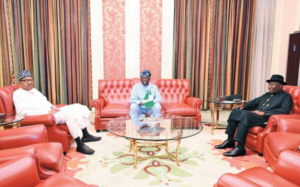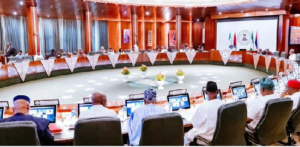How FG Seizes ₦83bn Hunger Protest Funds, Detains Political Allies
How FG Seizes ₦83bn Hunger Protest Funds, Detains Political Allies

The Federal Government has uncovered at least ₦83 billion in both cryptocurrency and cash linked to recent nationwide protests, as reported by The FIRST CLASS GISTS

The funds include $50 million in cryptocurrency, with $38 million frozen in four separate crypto wallets, and ₦4 billion contributed by political figures from Abuja, Kano, Kaduna, and Katsina.
This revelation came from National Security Adviser Nuhu Ribadu during the first Council of State meeting led by President Bola Tinubu at the Aso Rock Villa in Abuja. According to sources familiar with the meeting, Ribadu, who spoke on “The Nationwide Protest and Its Impact on National Security,” also indicated that a European individual is suspected of orchestrating the distribution of foreign flags during the protests and will soon be sought by the police.
Sources disclosed that local accomplices in Abuja, Kaduna, and Kano have been apprehended. “The NSA reported that the government tracked $50 million to cryptocurrency wallets used for protest donations, successfully blocking four wallets with $38 million. Additionally, ₦4 billion was found to be politically funded,” one source told The PUNCH.
The Council of State meeting, convened by President Tinubu, addressed the recent #EndBadGovernance protests along with issues of national security, economic stability, and food security. The Council includes the President, Vice President, former Presidents and Heads of State, former Chief Justices of Nigeria, Senate President, House Speaker, Attorney-General, Secretary to the Government, and all state governors.
Former Presidents Goodluck Jonathan and Muhammadu Buhari attended in person, while former Heads of State Yakubu Gowon and Abdulsalami Abubakar participated virtually. However, former President Olusegun Obasanjo and General Ibrahim Babangida did not attend.
The meeting followed a large-scale protest in Abuja, which saw a low turnout for a planned one-million-man march against rising living costs. On August 1, the protests turned violent, leading to property damage and at least 17 deaths. The use of Russian flags by some demonstrators in Kano and Kaduna was interpreted by the military as a treasonable act, and investigations are underway.
President Tinubu, in a broadcast on August 4, cautioned against allowing those opposed to democracy to use the protests to advance unconstitutional agendas. Reports indicated that security agencies had identified four politicians in Katsina, Kaduna, and Kano involved in promoting the use of Russian flags to incite regime change.
The Minister of Solid Minerals Development, Dele Alake, emphasized that no political figure would be permitted to incite an unconstitutional change of government. He described the protests as an attempt at forced regime change and reiterated that such changes must be achieved through elections.
At the meeting, Alake reported on various topics, including the nationwide protests’ impact on national security, the economy, and food security. Finance Minister Wale Edun updated the Council on economic performance, noting improvements in inflation and economic growth.
Governor AbdulRahman AbdulRazaq of Kwara State announced that the Council of State unanimously expressed confidence in President Tinubu. This meeting, the first in 18 months, serves as a crucial advisory body for the President on national security, economic policies, and key appointments.
The National Council of State is a key constitutional body that provides guidance to the President on significant national issues, including security, policy-making, and appointments. Although its recommendations are not binding, they often influence presidential decisions.
TRENDING SONGS
 Ahmad Yerima: Naval Officer to Face No Sanctions After Clash with Wike – Matawalle
Ahmad Yerima: Naval Officer to Face No Sanctions After Clash with Wike – Matawalle
 Trending Video: Muslim Man Joins Wife in Hallelujah Challenge ‘Dress Like Your Miracle’ Night
Trending Video: Muslim Man Joins Wife in Hallelujah Challenge ‘Dress Like Your Miracle’ Night
 Woman Seeks Advice as Late Brother’s Wife Refuses to Mourn Him Following His Death With Alleged Mistress
Woman Seeks Advice as Late Brother’s Wife Refuses to Mourn Him Following His Death With Alleged Mistress
 Nobody Cares About Fine Girls In The UK, I Miss Nigeria — Nigerian Lady Laments
Nobody Cares About Fine Girls In The UK, I Miss Nigeria — Nigerian Lady Laments
 Wedding Called Off: How Lady Cancels Wedding After Finding Out Finance’s Affairs With Her Bestie
Wedding Called Off: How Lady Cancels Wedding After Finding Out Finance’s Affairs With Her Bestie
 Heartbreak in Ikeja: Lady Weeps After Fufu Found in New Phone Package
Heartbreak in Ikeja: Lady Weeps After Fufu Found in New Phone Package
 Twist of Fate: Man Who Questioned Phyna’s ₦1Billion Demand Mourns Brother in Dangote Truck Crash
Twist of Fate: Man Who Questioned Phyna’s ₦1Billion Demand Mourns Brother in Dangote Truck Crash
 Tragedy in Enugu: Dangote Truck Claims Lives of Family of Five
Tragedy in Enugu: Dangote Truck Claims Lives of Family of Five
 Bangkok Crackdown: Nigerian-Thai Couple in Police Net Over Drug Trafficking
Bangkok Crackdown: Nigerian-Thai Couple in Police Net Over Drug Trafficking
 Family Rift: Reno Omokri’s Ex-Wife Says He Deserted Their Special Needs Son
Family Rift: Reno Omokri’s Ex-Wife Says He Deserted Their Special Needs Son
Share this post with your friends on ![]()













